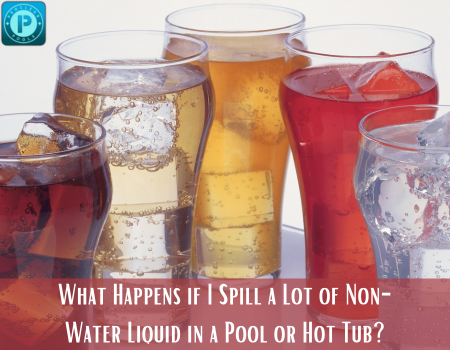Pools and hot tubs are designed to provide a relaxing, safe environment for swimmers, but they’re sensitive to anything added beyond water and the right balance of chemicals. When a non-water liquid—such as soda, alcohol, juice, or even soap—gets accidentally spilled, it can have significant effects on water quality, equipment, and swimmer safety. Here’s what to expect and what you can do to minimize the impact.
Immediate Effects of a Non-Water Liquid Spill
 The effects of a non-water liquid spill vary based on the type and quantity of the liquid. A small spill may have minimal impact, but larger amounts can disrupt water balance and introduce harmful chemicals or organic matter. Here are some immediate effects:
The effects of a non-water liquid spill vary based on the type and quantity of the liquid. A small spill may have minimal impact, but larger amounts can disrupt water balance and introduce harmful chemicals or organic matter. Here are some immediate effects:
- Water Chemistry Imbalance
Non-water liquids can alter the pH, alkalinity, and chlorine levels in your pool or hot tub. For instance, sugary drinks like soda or juice may introduce sugars and acids that shift the water’s pH level, making it more acidic. Alcohol can also alter pH and reduce sanitizer effectiveness. Imbalanced water chemistry can cause skin irritation, eye discomfort, and even corrosion of metal surfaces over time.
- Increased Contaminants
Most non-water liquids contain ingredients that pools and hot tubs aren’t designed to filter or neutralize, such as sugars, dyes, and preservatives. Sugary substances, for example, can provide nutrients for algae and bacteria, promoting faster growth. Other liquids may leave residues that attract more debris and microorganisms, leading to cloudy or foul-smelling water.
- Increased Biofilm and Foam
Liquids like soap, shampoo, or certain personal care products create foam when they interact with water jets, particularly in hot tubs. This foam can cover the surface and introduce biofilm—a slimy layer that provides an environment for bacterial growth—into pipes and filtration systems.
Potential Long-Term Effects on Pool and Hot Tub Systems
- Strain on Filtration and Heating Systems
Many liquids contain particles that can clog filters. Sugars and oils especially can form sticky residues that slow down the filtration process, reducing the system’s efficiency. Over time, clogged filters force the pump to work harder, increasing the risk of overheating or breakdown. Hot tubs are even more vulnerable due to their smaller water volume and filtration systems.
- Increased Maintenance Costs
If non-water substances linger in your pool or hot tub, they can cause long-term damage that requires costly repairs. Algae and bacterial growth triggered by sugary or acidic liquids may necessitate a deep cleaning, water replacement, or chemical shock to restore safe water quality. Over time, these substances can also damage filters, pumps, and other equipment.
- Staining and Damage to Surfaces
Colored liquids, such as juices or sports drinks, can stain the surfaces of pools and hot tubs, particularly if they contain artificial dyes. These stains can be tough to remove and may require special cleaning solutions. Additionally, acidic liquids can corrode metal surfaces, like ladders or jets, causing rust and premature wear.
How to Address a Spill in Your Pool or Hot Tub
If a non-water liquid spill occurs, prompt action can minimize the damage. Here’s what to do:
- Identify the Type of Liquid
First, determine what kind of liquid was spilled. Sugary, acidic, or foamy substances each have unique effects on water chemistry and require different treatments.
- Remove Visible Debris
Use a skimmer to remove any floating debris from the spill. In the case of oils or soap, a skimmer can also remove surface residue before it disperses further.
- Test and Adjust Water Chemistry
Use a testing kit to measure the pH, alkalinity, and chlorine levels. For minor spills, rebalancing the pool’s pH and chlorine may be sufficient. Pools and hot tubs with serious imbalances, however, may require a shock treatment—a process where chlorine levels are temporarily raised to destroy contaminants.
- Consider Partial or Full Drainage
For substantial spills, especially in hot tubs, partial or complete drainage may be necessary. Hot tubs hold less water than pools, so a large spill will have a greater impact on water quality. Draining and refilling can save you time and effort compared to continuous chemical adjustments and cleaning.
- Clean Filters Thoroughly
After a spill, it’s essential to clean the filters to remove any residues that might be lingering. Remove the filter, rinse it thoroughly with a hose, and consider using a filter cleaner if you suspect oils or sticky substances. In extreme cases, replacing the filter may be necessary.
- Contact a Professional, if Needed
If you’re unsure about the extent of contamination or how to proceed, pool and hot tub professionals can provide expert advice or hands-on assistance. They can test for contaminants that regular kits might miss and recommend specialized treatments to restore safe conditions.
Preventing Future Spills
– Designate a Dry Zone: Establish a “dry zone” near the pool or hot tub for food and beverages to avoid accidental spills.
– Use Covered Containers: Encourage guests to use covered cups if drinks are allowed around the pool or hot tub area.
– Set Poolside Rules: Remind everyone of the importance of keeping non-water liquids out of the pool to avoid potential issues.
Spilling non-water liquids in a pool or hot tub can have several unwanted consequences, from water chemistry imbalances to costly equipment damage. However, quick action and proper treatment can often minimize these effects and restore your pool or hot tub to pristine condition. If the spill is large or the water quality isn’t improving with your efforts, don’t hesitate to contact a pool professional for support. A little caution and regular maintenance can keep your pool or hot tub safe, clean, and ready for relaxation. Pro Clear Pool provides a full range of professional pool services to keep your pool clean, safe, and well-maintained year-round.
